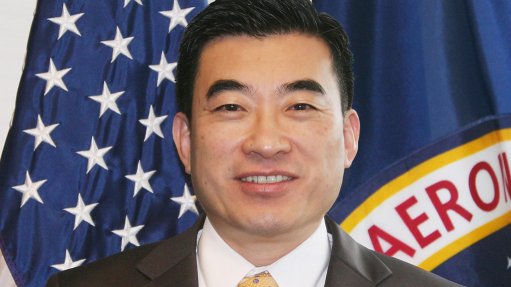
Nasa Associate Administrator for Aeronautics Research Mission Directorate Dr Jaiwon Shin
Photo by: Nasa
The global aviation industry continues to be a rapidly growing sector, far from reaching maturity. This was stressed at the recent International Forum for Aviation Research (IFAR) open session at the Council for Scientific and Industrial Research (CSIR) in Pretoria by US National Aeronautics and Space Administration Associate Administrator for Aeronautics Research Mission Directorate Dr Jaiwon Shin.
"Aviation is not a dying industry; it is not a mature industry. It is growing in leaps and bounds," he affirmed. "This is because countries are getting richer. In a lot of developing countries aviation demand is growing significantly."
"Many countries have chosen aviation as a growth engine for their economies," he noted. "Dubai, the UAE [United Arab Emirates] is a really good example." Including the activities of national carrier Emirates, Dubai hopes to generate 40% of its gross domestic product from aviation.
A striking development is that, just as in the 1930s and 1940s, a lot of very wealthy entrepreneurs are getting involved in aviation, a sector they know little about. Google and Amazon getting involved with unmanned air vehicles are good examples.
"It could be a fad. ... It does not look like a fad." Technology convergence is happening in every sector, with revolutionary impacts. "A renaissance of aviation is upon us," he argued.
For South Africa, because of its aviation infrastructure, he suggested that "this might be a golden opportunity. ... A lot of entities and countries ... are moving into this."
The new technologies (small UAVs, networking, Internet of things, and so on) opened the potential for aviation to move from a high-technology but low-volume production industry to a high-technology high-volume production sector. High-volume production would bring costs down.
"A country like South Africa may be very well positioned to catch this new market," stated Shin. But penetrating this new market would require the building of an ecosystem of universities, government-funded research institutes (like the CSIR, although the CSIR is actually partly State-funded) and businesses. "To make [such] an ecosystem like a well-oiled machine is not an easy thing to do!"
(IFAR, founded in 2010, exists to facilitate networking, information exchange, cooperation, communication and education within the global aviation research community. Its membership is now composed of 26 aviation research institutions, representing more than 35 000 aviation researchers, from all around the world. It held its 2017 Conference at the CSIR in Pretoria.)